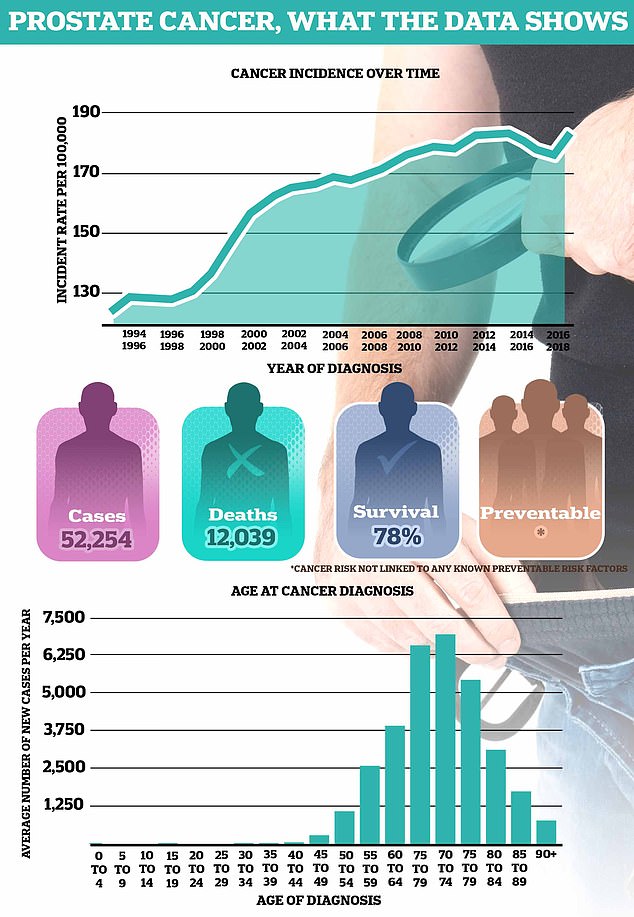Prostate cancer is NOT just one disease: Huge breakthrough as scientists discover disease is actually split into two types – and could save thousands of lives
Thousands of lives could be saved after the discovery of a new type of prostate cancer, experts say.
Artificial intelligence has helped scientists identify a new form of the disease that could revolutionize the way the disease is diagnosed and treated in the future.
Their research found that prostate cancer, which affects one in eight men in their lifetime, includes two different subtypes.
And the revelation could lead to tailor-made treatments for each individual patient, depending on the type he or she has.
The team, led by researchers from the University of Oxford and the University of Manchester, used artificial intelligence (AI) to study changes in the DNA of prostate cancer samples from 159 patients.

Stephen Fry, 66, was diagnosed with prostate cancer in 2018 but has since recovered. Last week he backed the #CatchUpWithCancer campaign and denounced the ‘deadly’ delays suffered by tens of thousands

On average, more than 52,000 men are diagnosed with prostate cancer every year in the UK, making it the most common form of cancer in men. About 12,000 men die from the disease every year – the equivalent of one man every 45 minutes
They identified two different cancer groups among these patients and were able to generate an ‘evolutionary tree’ showing how each group evolved – eventually converging into two different disease types called ‘evotypes’.
This is important because until now, prostate cancer was thought to be just one type of disease.
Lead researcher Dr Dan Woodcock, from the University of Oxford, said: ‘Our research shows that prostate tumors progress along multiple pathways, leading to two different disease types.
‘This understanding is crucial because it allows us to classify tumors based on how the cancer progresses, rather than solely on the basis of individual gene mutations or expression patterns.’
The researchers worked together as part of an international consortium called The Pan Prostate Cancer Group, founded by scientists from the Institute of Cancer Research (ICR) and the University of East Anglia to analyze genetic data from thousands of prostate cancer samples in nine countries.
The team’s collaboration with Cancer Research UK (CRUK) – which funded the study – aims to develop a genetic test that, when combined with conventional staging and assessment, can provide a more accurate prognosis for each patient, enabling tailored treatment decisions are.
Dr. Rupal Mistry, CRUK’s senior science engagement manager, said: ‘The work published today by this global consortium of researchers has the potential to make a real difference to people affected by prostate cancer.
‘The more we understand about cancer, the more likely we are to develop treatments to beat cancer.
‘We are proud to have helped fund this groundbreaking work, which has laid the foundation for personalized treatments for people with prostate cancer, helping more people beat their disease.’
Researcher Professor Colin Cooper from the University of East Anglia’s Norwich Medical School highlighted that although prostate cancer is responsible for a large proportion of all male cancer deaths, it is more often a disease that men die from than from.
This means that unnecessary treatments can often be avoided, sparing men from side effects such as incontinence and impotence.
He added: ‘This study is very important because until now we thought prostate cancer was just one type of disease.
‘But only now, with advances in artificial intelligence, have we been able to show that there are actually two different subtypes at play.
‘We hope that the findings will not only save lives in the future through better diagnoses and tailored treatments, but that they can also help researchers working in other cancer areas to better understand other types of cancer.’
Dr. Naomi Elster, research director at Prostate Cancer Research, said: ‘These results could be the start of us taking the same ‘divide and conquer’ approach to prostate cancer as we do to other diseases such as breast cancer. ‘
The findings have been published in the journal Cell Genomics.
